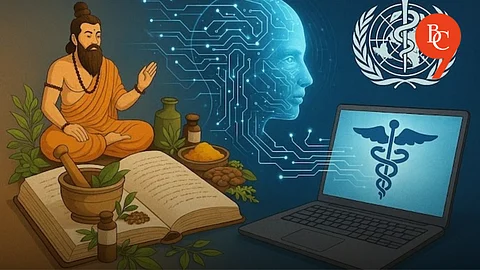

India has become the first country in the world to digitise traditional medicine through an AI-powered knowledge library. The groundbreaking initiative was launched under the supervision of the Ministry of Ayush (Ayurveda, Yoga & Naturopathy, Unani, Siddha and Homeopathy) in collaboration with leading tech institutes and AI innovators.
This AI-enabled digital library is designed to preserve, analyse, and globalise India’s age-old medical systems such as Ayurveda, Unani, Siddha, and Homeopathy by compiling centuries-old texts, treatment methods, medicinal formulations, and holistic healing practices into a searchable, verified, and multilingual platform.
Union Minister of Ayush, Sarbananda Sonowal, unveiled the initiative in an event celebrated as a milestone for global healthcare systems.
“India has a vast repository of knowledge in traditional medicine. With this AI-powered digital library, we’re making these time-tested practices accessible worldwide, ensuring they benefit humanity at large,” said Minister Sonowal.
The digital platform uses Natural Language Processing (NLP) and machine learning algorithms to scan, interpret, and index ancient Sanskrit, Tamil, Arabic, and Urdu manuscripts. It then converts the data into reader-friendly formats while preserving its original integrity.
Searchable access to more than 50,000 ancient manuscripts and over 2 lakh pages of traditional medical literature
Cross-referencing between modern science and historical practices
Multilingual translations for global accessibility
Authored contributions from scholars, practitioners, and researchers
The integration of artificial intelligence makes this database the world’s most scientifically organised repository of traditional knowledge, opening doors for evidence-based research, standardisation, and global acceptance of Indian traditional medicine.
The platform also invites researchers and pharmaceutical companies to access these time-tested practices to develop new therapeutic solutions, especially for lifestyle diseases and chronic conditions.
India’s move has already attracted attention from the World Health Organization (WHO), which recently opened a Global Centre for Traditional Medicine in Gujarat.
Several countries including Japan, Germany, South Korea, and Kenya have expressed interest in integrating India’s AI-powered digital library into their own healthcare research ecosystems.
By digitising traditional medicine, India not only secures its 5000-year-old heritage but also positions itself as a global powerhouse in the $4.5 trillion wellness economy. The integration of tech and tradition supports the vision of Make in India and Digital India, fostering innovation in Ayurveda and allied sciences.
This initiative empowers both researchers and everyday citizens by improving access, transparency, and efficacy in traditional treatment options.
